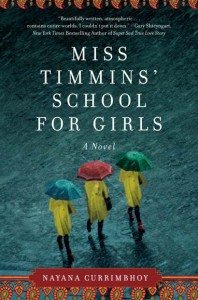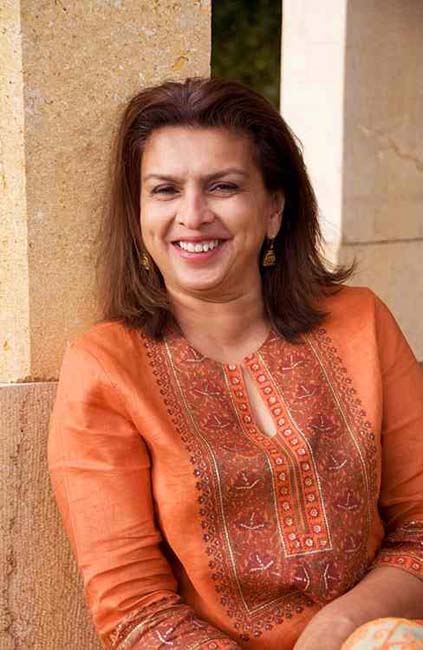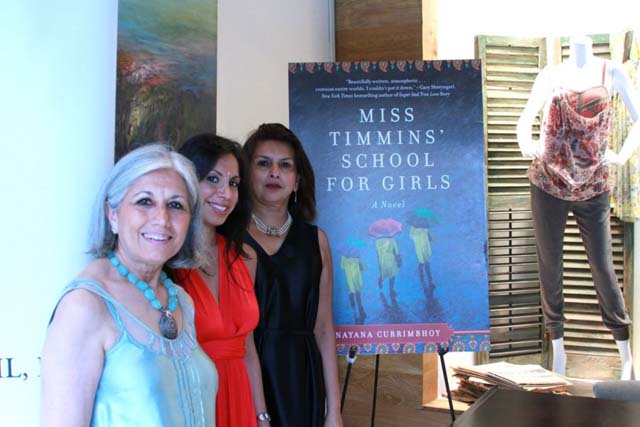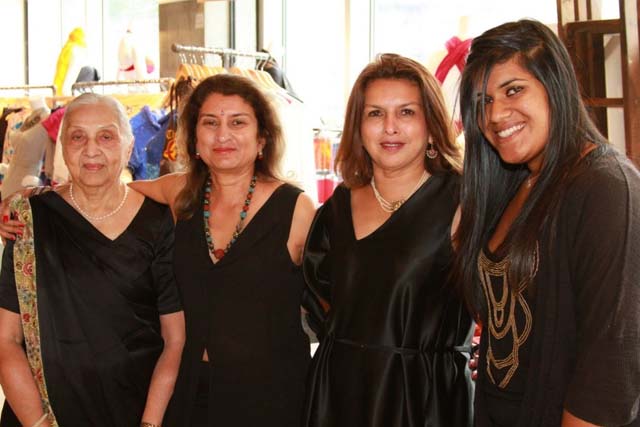
First Novel: Nayana Currimbhoy’s Excellent Adventure

Yet another writer has made her debut with a first novel and once again you realize that the literary world may have been around forever but every new writer brings her own unique perspective to it, and creates yet another view, another prism of lives lived and loves lost and gained.
Traditional Brahmin values, sex and rock n roll and drugs, caste and class, British missionaries, forbidden love affairs and murder, Indian schoolgirls playing British – all in the same India of the 70’s. ‘Miss Timmins’ School for Girls’ is a lush coming of age story and a murder-mystery rolled into one, set in an all-girls school in the sleepy hill station of Panchgani in India. It also happens to be Nayana Currimbhoy’s first novel – and that is surprising for the writing is seasoned, evocative, taking you into a compelling yet insular universe.
For Currimbhoy, the success of this first novel is particularly sweet because she wrote it after having led another life as a businesswoman and freelance writer. It was five years in the making and wonders of wonders, in this hard new world of recessions and cut-backs, ‘Miss Timmins’ found a topnotch publisher immediately.
It has made quite a splash, with some great reviews, and some mixed ones. ‘Miss Timmins’ has been on best selling book lists in India. Oprah Winfrey’s O magazine wrote about it and several other media reviewed it. There’s been a definite buzz about it and the book readings have been packed.
Really no surprise since Indian women writers who write in English seem to be much in demand and India itself appears to be a favored subject. I find Indian writers bring such an inimitable use of language, of time and place to the worlds they create. For someone who grew up in India, there is a great deal of identification with the colorful universe Currimbhoy constructs and which her protagonist Charulata Apte inhabits.

Currimbhoy has a strong command of language – evocative images are invoked and you become the fly on the wall watching it all. Yet for me, some parts did work better than others – I particularly loved the storyline of Charu and her dysfunctional family, of her home life. Panchgani is beautifully recreated and Charu is absolutely all flesh and blood. You find yourself caring about what happens to her – yet find yourself indifferent to some of the other players who are not etched as strongly.
The murder mystery keeps you on your toes, playing detective and turning the pages – and at the same time thinking of many larger issues, for social commentary is woven seamlessly into the narrative. One looks forward to the next novel from this gifted writer.
12 Questions for Nayana Currimbhoy
1. The writing is so lyrical and assured, that it’s hard to believe it’s a first novel – in fact, a first piece of fiction. How did you contain this story within yourself for so many years, and finally decide to let it go into the world?
Actually, I have been dreaming of writing a novel since I was 14 years old. I just did not get to it until I was 50! In between, I came to America, worked for magazines and newspapers, and wrote a lot of non-fiction, including a biography of Indira Gandhi.
Through it all, I wanted to write fiction. I did not have an actual novel in my mind, but I took two pieces of advice to heart.
First, the famous author E. L. Doctorow has said: “Writing a novel is like driving a car at night. You can see only as far as your headlights but you can make the whole trip that way”
Second: the often quoted saying, “Write about what you know.”
So, I started with a boarding school in a small hill station run by British Missionaries in 1974, where little Indian girls are eating porridge and Scottish dancing in kilts! It was a strange time and place, and I thought it would be a good idea to place my novel in this school, in this town, at the same time as I was there. From there on, it’s pure fiction.
Writing fiction was like coming home. I spent five years writing the book, but I enjoyed every minute of it. I am so happy that you found Miss Timmins fun to read. That is all I wanted to do – have people dream in my story, just as I have dreamt in so many novels all my life.
2. Growing up, did you ever think you were going to be a writer and what were the first things you wrote?
My mother says I was making up poems at four. I loved to read and to write, and I got a lot of positive feedback from my teachers. My little essays were always being read aloud in school. So, I guess it was only natural that I decided to be a writer. I doubt if I can even do anything else!
3. You grew up in Bombay and your writing clearly shows you know the city and the hill station of Panchgani well. Did you travel there a lot and how did you develop the novel over the years?
You are right, I did grow up in Bombay, and I was in a boarding school in Panchgani from the age of seven. I go back to Bombay often, but I had not been back to Panchgani in twenty years.
Once I started the novel, it was a conscious decision not to go back. I wanted to remember the little hill station as it was in the 1970s, when there were only three cars and table-land (the volcanic plateau that dominates Panchgani’s landscape) was a place of mystery and magic, as it is in my novel.
After the novel was published this summer, I was asked to go back to speak at the school, and that is the first time I did go back. There are traffic jams in the bazaar, and a mela on table-land!
4. You’ve done this first novel relatively late in life after having a full-fledged career in a different field. How hard is it to break into the writing field and would you recommend this round-about journey to others?
Writing a novel is a lonely pursuit. If you are a painter or a photographer or an architect, people can see your work at a glance, they can see a work in progress and understand it in a few minutes.
To write a novel is to create a world. And you have to carry that world in your head the whole time you are writing the novel.
At parties and at the readings and panels I go to, I meet a lot of people who say they are writing a novel. I think it is easy to start a novel, but takes perseverance, and I would say obsession to finish it. Especially a first novel, since you do not even know if it will ever see the light of day.
It took me five years to complete the novel. I did have good friends who read it from time to time and made comments. That helped a lot, since being in the middle of the novel is like being inside a labyrinth, and it’s good to have some outside view into it.
My advice to anyone who has ever wanted to write a novel is to take Doctorow’s tip, and just start the journey. If you get bored or have nothing to say in a short while, then drop it. If you finish it, you are almost there!

5. How hard was it to find an agent? Again, any tips for newbies?
Everyone tells you how hard it is to get a first novel published. Even my friends in publishing told me this. But I believe that a good story will rise up to the surface in the end. I see debut novels being published all the time!
I started the novel the day I turned 50. I looked at myself in the mirror, and I thought it’s now or never. So I started it, writing at nights, after my family was asleep. Then the characters took over, and I began to enjoy writing it. And through it all, I kept telling myself, “What have I got to lose? If it does not get published, I am still better off than not having written it at all.”
Once I finished writing Miss Timmins’ I sent it to three agents in New York. One of them responded within two weeks, saying she loved it, and wanted it. And then she sold it Harper. So I was lucky in that my path to publishing was a charmed one.
My advice for getting a good agent is to try and get someone to recommend you to an agent, because that is the way to get a foot in the door. Even if you know just one writer, or one person who works as an assistant in publishing, ask that person for a name, and then when you write your query letter, use that person’s name as a recommendation.
Good agents get so many unsolicited manuscripts; they call it “the slush pile” so everything you can do to get a small step ahead helps. Another very recent development is that Amazon is getting into publishing, and they do not require you to have an agent. I do not know how that will change the game, but it might make it easier for first time authors.
6. The best part of the book to me was the vivid and lyrical descriptions of the Indian life, of family relationships and prose which often reads like poetry. How much did you draw upon personal experience and growing up in the India of the 70’s?
As I have said earlier in this interview, the setting of my story is what I know, the actual story is pure fiction. My experiences of growing up in the seventies – the clash between conventions and expectations of a traditional middle class Indian family, and the new philosophy of personal freedoms espoused through the music of Bob Dylan and the Beatles that has shaped the baby boomer generation – became intensified when I saw them through the eyes of my heroine, the shy and sheltered Charulata Apte.
My heroine and main narrator is Charulata Apte, a 21-year-old teacher who leaves her sheltered life in Indore to come to Panchgani to teach at Miss Timmins’ School for Girls. Charu has a red mark on her face, and a dark family secret. As a result, she is a shy and secretive girl, given to imagining things.
She wears a hard shell, which is pierced as she goes through the events in the book. She is drawn to the pot smoking, Nabokov-reading hippies who hang around the town of Panchgani, and into a couple of unsuitable affairs. And then she becomes a prime suspect in the murder of a teacher. It is when she is thrown into the cauldron that she comes of age. So, although my book is a snapshot of the seventies in a small place that I know, the experiences are magnified through the eyes of my heroine.
7. ‘Miss Timmins’ was featured in O magazine, you’ve given interviews on NPR and other major outlets, gone on a book tour. Your thoughts on the fame and celebrity aspect of an author’s life?
Although I have never been a public person, and was very nervous about public appearances at first, I am getting more relaxed, and now, it really is fun, to face a room of people who want to find out more about you, about your book. I could get used to it!
8. This book took a long time to gestate – are you planning a sequel with Charu or are you moving on to new territory?
I am writing another novel, it is set in India, again, but not in Panchgani. I am putting Charu and gang aside for now, and starting afresh, in another time, another place. Let’s see where that leads. I am hoping of course to finish it much sooner!
9. As a first-time novelist who has received some great reviews and some mixed ones. Do you feel you’ll write your next book differently?
At first, I was very thin-skinned. I remember going to a party a few days after the book was published, and a woman I did not know came up to me, and said she was “very disturbed” by an image in my book. I did not sleep that night! My first critical review broke my heart; it was as if someone was flogging my only child. But now, three months into it, I am already quite blasé. I love the good reviews, but I also enjoy the ‘good bad reviews’. Sometimes I agree with them.
My next book will be different because of what I have learned in writing this book, not because of the good or bad reviews. Like any art, the wellspring of creativity must come from within. Then only can you hope to achieve something pure and good. If you start to tailor your story to the opinion of reviewers, I think it would lose its richness and texture, its essence.
10. Do Charu, Merch and Moira Prince still live on in your thoughts or have you finally said goodbye to them?
Actually that is such a perceptive question. All those years, they were my alternative reality, my escape. Even now, I wake up at night and think, “Oh Charu should say this to Merch when they are sitting under the tree near the black rocks,” and then I wake up and realize it’s over! It is quite lonely without this castle in my head. The only solution is to get my head into another novel right away!
11. What’s been the best part of writing this book? And the worst?
I really have to say that I enjoyed every single thing about writing the novel, even the edits and rewrites, and disputes I had with my agent and editor over that. I feel I came so close to not writing it at all – just got in by the skin of my teeth, as it were.
I feel lucky that I was able to complete the novel, and even get it published and have a great editor behind me. The worst part was waiting. The gestation period in publishing is long, more than a year. In this day of instant everything, it can feel like forever.
12. What’s next for Nayana Currimbhoy?
Hope my next novel will also have wings!

1 Comment
Lovely interview! And here’s to many, many more novels, Nayana. Waiting for you to launch it here in Chennai! Cheers! Aysha